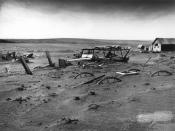Two books by different historians paint a largely similar picture of the Great Depression of the 1930s, but have quite different attitudes about this period. The Age of Extremes, The Short Twentieth Century 1914 - 1991, written by Eric Hobsbawm, who experienced the depression first hand, exaggerates somewhat the social suffering of this period. Whereas Britain in the Depression: Society and Politics 1929 - 1939 was written by two much younger historians, John Stevenson and Chris Cook, whose lives were not directly affected by the depression and can examine the period without bias, but they do tend to minimise the suffering caused.
Britain in the Depression deals as it's title suggests, only with the effects of the great depression on Britain, whereas The Age of Extremes is a history of the world in the twentieth century. As such, Britain gives a much more in depth look at this period, and Age of Extremes only briefly goes over Britain in the depression, focusing more it's impact on the world as a whole.
However, the two accounts do agree that was is the worst, most global economic disaster the world has ever seen, that it put millions out of work, created massive inflation in many areas, virtually destroyed most industry, and slowed world trade almost to a halt. They also both agree that while it made a large percentage of the population unemployed, for those with a job, things were getting better and better. However, Stevenson and Cook, acknowledge that it was a time of great poverty, but say that it wasn't as widespread as we have come to believe, in fact for the majority of the British populace who were employed, life was only getting easier. Hobsbawm's view of the 1930s is very much influenced by his own experiences...


